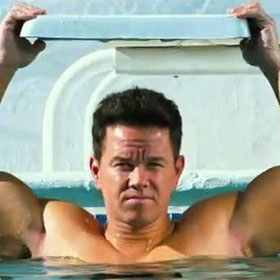‘Pain And Gain’ Movie Review: Michael Bay Gruesomely Satirizes The American Dream And A Real-Life Murder

2.5/5
What do you get when you combine beefy leading men in spandex, murder, Miami, and some truly mortifying 90s fashion? Why, the dramedy Pain and Gain, of course.
In director Michael Bay’s smallest-scale production to date, Mark Wahlberg plays Daniel Lugo, a narcissistic fitness instructor in pursuit of the "American Dream." Encouraged by his excessive greed, ego and aggressive motivational speaker Johnny Wu (The Hangover’s Ken Jeong), Lugo decides to attain his dream of infinite wealth and power, something his sleazy new client Victor Kershaw (Monk’s Tony Shaloub) just so happens to possess. Lugo believes that he and the world would be better off if Kershaw wasn’t rich, so he enlists the help of Muscle-Juice-addicted Adrian (Anthony Mackie) and born-again Christian/former druggie Paul (Dwayne “The Rock” Johnson) to kidnap Kershaw and extort his fortune. The trio’s efforts to bag Kershaw are absurdly hysterical. In one scene, they attempt to raid Kershaw’s house, only to find him celebrating Shabbat with his family. Religious Paul refuses to interrupt the holy occasion. Finally the gang succeeds in tasing Kershaw and brings him to a decrepit warehouse stocked with sex toys. There, Adrian and Lugo torture him until he eventually signs away his money and property, while Paul, the most compassionate of the group, befriends Kershaw and tries to convert him to Christianity.
After a failed attempt to kill Kershaw, which includes driving over his body, the gang enjoys their newfound wealth. Lugo moves into Kershaw’s house, purchases the riding lawnmower he’s always wanted, and trains the neighborhood kids in a cutthroat fitness regime. Adrian blows his share on medication for steroid-induced impotency and Paul becomes addicted to cocaine again and has his toe shot off after a robbery gone wrong. Meanwhile, deemed crazy by local police, the incapacitated Kershaw lives in a seedy motel and hires private investigator Ed Du Bois, played by Ed Harris, to seek out the robbers. When Adrian and Paul, desperate to replace their funds, visit Lugo with a new kidnapping scheme, they target a gaudy millionaire and his girlfriend. Unfortunately, this is when things turn grisly and the darkly comical tone really flourishes.
The gritty vibrancy of 90s Miami is emphasized here in bold colors and attention to detail from that era (Wahlberg dons a fanny pack very convincingly). The white-washed walls of the buildings, perpetual sunshine, sleek cars, and pristine pools flanked by glistening, tanned models easily transport and ground the viewer to a different time and place. The overt extravagance stresses that none of it is meant to be taken seriously. The film also employs some useful camera techniques, such as the SnorriCam, to better show the microcosms in which the characters interact.
The actors provide the most enjoyment. Johnson plays timid well, though he is physically the bulkiest and most intimidating out of all the leading men. His character struggles with his cocaine addiction, faith, and loyalty to the gang, as seen towards the film’s end. He could garner the most sympathy from the audience, if there was any sympathy to be had. But no character is worth rooting for. Wahlberg’s role is pretty standard, though his outbursts are pretty daunting when you begin to realize how far he is willing to go to cover up evidence. In a film dominated by arrogant bodybuilding lunatics, the supporting characters deserve credit for introducing some sanity. Ed Harris is by far the coolest and calmest of the bunch and Rebel Wilson is hysterical as Adrian’s horny nurse.
I liked this film up until the end, when the real-life people involved in such far-fetched crimes are revealed. Suddenly the comical tone didn’t seem so appropriate anymore. In sporadic voiceovers throughout the movie, Ed Harris’s character, among others, reminds the audience that this is indeed based on a true story, though I had a difficult time accepting that fact when the plot seemed so implausible. The movie has its cringe-worthy moments, especially when Paul publicly barbecues body parts, which are made all the more disturbing in retrospect. After seeing the movie, I heard that family members of the victims of the Sun Gym Gang were outraged by the film’s tone. Their concerns are understandable. Torture and murder are satirized as a way of achieving a ridiculous dream, and I don’t know how effective that is in the long-run. In this regard, Pain and Gain loses some of its entertainment value.
For more like this 'Pain and Gain' movie review, check out Uinterview's movie review section here.
RELATED ARTICLES
Get the most-revealing celebrity conversations with the uInterview podcast!





Leave a comment